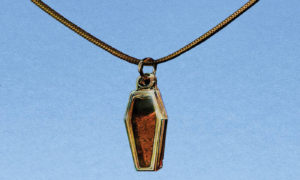Sufjan Stevens has always written songs dense with mythological and personal points of reference; emotions and sentiments bubble perceptibly on the surface, but truly understanding them takes consideration and scrutiny. While this remains so on his newest effort, Carrie & Lowell, the album’s power lies in its directness and lack of ambiguity. The cover itself bears a photo of the album’s namesakes: Stevens’ mother and stepfather, Carrie and Lowell, their names printed below their images in stark white letters like labels. This is an album built on naming. At the end of 2012, Stevens’ mother died of stomach cancer. Over the course of these eleven songs, Stevens works to discover his own sorrows, regrets, and frustrations–to name them out loud in an attempt to confront and deal with them.
Both nights at Bass Concert Hall, Stevens performed the record in its entirety, with songs in a slightly altered order from the album, and with “Blue Bucket of Gold” acting as an epic closer after a selection of other material. From my first listen to the new album, I was taken aback by the intimacy of its lyrics. Stevens has always been emotive, but these songs reach new levels of exploring his personal psychology. Stevens’ mother left him and his siblings with his father when Stevens was just one year old. Through visits to Oregon to visit his mother and stepfather, Stevens learned more about her as well as her ongoing struggle with schizophrenia, drugs, and alcohol. As moved as I felt listening to the record, seeing Stevens perform these songs in the respectful awe of a huge concert hall resonated even more deeply. My eyes welled with tears as Stevens sang, “When I was three, three maybe four, she left us at that video store.” Stevens’ willingness to perform songs built on such clear, unembellished yet emotionally complex memories overwhelmed me completely.
Most of the songs from Carrie & Lowell were given additional instrumentation, including disconcerting bursts of noise on heartbreaking song “Fourth of July” and added percussion on many of the tracks. However, none paralleled the cacophonous roar of “Blue Bucket of Gold,” which culminated in an intense array of frenetic lights and pulsing, expansive instrumentation that swelled with the power of a thunderstorm. Before the song reached its height, the five-piece band created a dreamy, ambient soundscape as two mirrored spheres reflected hundreds of thin beams of light, creating imagery reminiscent of twin planets on the verge of explosion somewhere in the depths of the cosmos. An audible gasp spread across the theater. As I watched the spectacle, I became acutely aware that Stevens’ music often induces that same sort of breathtaking wonder.
While Stevens performed songs, a series of elongated panels of screens showed old home movies, presumably from his own life. The entire night felt more and more like a window into the recesses of Stevens’ heart and mind. After he finished performing all (but one) of the songs on Carrie & Lowell, Stevens paused for a long monologue that wandered through memories (perhaps some real and some fabricated) of his early life: pets named for the celebrities they were in past lives by his psychic-visiting stepmother, a giant pile where his family burned trash (and the occasional dead pet), schemes to skip school and stay home to melt down Star Wars toys with his brother. The second night of Stevens’ two in Austin yielded an equally long and rambling diatribe, but this one recounted a second-person narrative beginning with an actual birth and carrying on into adulthood. I suspect the details were rendered from equal parts of Stevens’ own life and imaginative details he saw fit to include. The audience was asked to recall that alcoholic oboe tutor we had who soaked her reeds in gin and the time we cut off our finger with a power saw. Just as he is in song, Stevens exudes dark humor and a brilliant affinity for detail when he speaks.
Furthering the somber tone of the evening’s song selection, Stevens elected to play mostly stripped-down songs from past records, including a surprising three (out of only five songs played beyond those from Carrie & Lowell) from 2004’s Seven Swans: “In the Devil’s Territory,” “To Be Alone With You,” and “Sister,” the latter of which he dedicated to his sister Megan. Stevens also played a beautiful acoustic version of “Futile Devices” from Age of Adz before the encore. On both nights, upon returning to the stage, Stevens sat at the piano to play the gorgeous and arresting “Concerning the UFO Sighting Near Highland, IL.” The encore on both nights also included “The Dress Looks Nice On You,” and Michigan‘s “For the Widows in Paradise, For the Fatherless in Ypsilanti.”
Each night offered a different encore closer, and both served as a highlight for the evening. On Tuesday, Stevens played the heartrending “Casimir Pulaski Day,” while Wednesday’s crowd was treated to “The Predatory Wasp of the Palisades Is Out to Get Us!” a song Stevens has not played live since January of 2008. Austin received an incredible gift in hosting one of contemporary music’s most outstanding musicians and songwriters for two consecutive nights. Similarly, with his sincerity and intimate vulnerability, Stevens has given the world an incomparably valuable artifact in Carrie & Lowell–songs of great significance that tell stories of the everlasting quality of the human spirit and the transcendent nature of memory.
Moses Sumney opened the night with a set built on guitar and vocal loops. Sumney laid down tracks of percussive clicks before exhibiting impressive vocal dexterity as he sang and crooned over them. I had seen Sumney perform once before, outdoors at Stubb’s; his presence in the theater made a much more conducive environment for his nuanced and intricate performance.
Check out photos from the night below. All images © Bryan C. Parker & Pop Press International; all rights reserved. Click any image to open in slideshow viewer.
- Sufjan Stevens at Bass Concert Hall; photo by Bryan C. Parker
- Sufjan Stevens at Bass Concert Hall; photo by Bryan C. Parker
- Sufjan Stevens at Bass Concert Hall; photo by Bryan C. Parker
- Sufjan Stevens at Bass Concert Hall; photo by Bryan C. Parker
- Sufjan Stevens at Bass Concert Hall; photo by Bryan C. Parker
- Sufjan Stevens at Bass Concert Hall; photo by Bryan C. Parker
- Sufjan Stevens at Bass Concert Hall; photo by Bryan C. Parker
- Sufjan Stevens at Bass Concert Hall; photo by Bryan C. Parker
- Sufjan Stevens at Bass Concert Hall; photo by Bryan C. Parker
- Sufjan Stevens at Bass Concert Hall; photo by Bryan C. Parker
- Sufjan Stevens at Bass Concert Hall; photo by Bryan C. Parker
- Light at Bass Concert Hall; photo by Bryan C. Parker
- Moses Sumney at Bass Concert Hall; photo by Bryan C. Parker
- Moses Sumney at Bass Concert Hall; photo by Bryan C. Parker
- Moses Sumney at Bass Concert Hall; photo by Bryan C. Parker
- Moses Sumney at Bass Concert Hall; photo by Bryan C. Parker

































